Drifblim is strong enough to lift Pokemon or people but has no control over its flight. This causes it to drift with the wind and end up anywhere.

A collection of Varvara programs from an alternate past.
These are the principal utilities that I have running at all times while I work on the computer. They started off as ports of Macintosh System 7 programs, but have since been standardized and optimized to do as little redraw and disk access as possible.
They all support window shade, of course.
Unix systems
To make a rom usable across your unix system like an application, edit ~/.bashrc, and make the location of your Uxn emulator(example: ~/bin) visible by adding the lines:
export PATH=$PATH:$HOME/bin alias calendar='uxn11 ~/roms/calendar.rom' alias notepad='uxn11 ~/roms/notepad.rom' alias noodle='uxn11 ~/roms/noodle.rom' alias oekaki='uxn11 ~/roms/oekaki.rom' alias turye='uxn11 ~/roms/turye.rom' alias theme='uxn11 ~/roms/theme.rom' alias left='uxn11 ~/roms/left.rom' alias nasu='uxn11 ~/roms/nasu.rom' alias nebu='uxn11 ~/roms/nebu.rom' alias dexe='uxn11 ~/roms/dexe.rom' alias cccc='uxn11 ~/roms/cccc.rom' alias m291='uxn11 ~/roms/m291.rom' alias drifblim='uxncli ~/roms/drifblim.rom' alias drifloon='uxncli ~/roms/drifloon.rom' alias uxnfor='uxncli ~/roms/uxnfor.rom' alias uxnlin='uxncli ~/roms/uxnlin.rom' alias hx='uxncli ~/roms/hx.rom'
After saving, run source ~/.bashrc to apply your changes, and enjoy calling the programs from anywhere, like:
left src/main.tal
Drifblim is a Uxntal assembler.

An assembler transforms a textual source file into a binary program file, it is the tool that the Uxntal programmer uses to transform a tal file, into a rom file. This assembler is written in Uxntal itself, and is designed to help bootstrap the ecosystem, it outputs a symbols file and expects the standard Uxntal Notation.

The assembler comes in one of three flavors:
- drifloon.rom: Relies only on the console device and does not use the expansion device.
- drifblim.rom: Full terminal version.
- drif.rom: Graphical terminal version.
To use the terminal version:
uxncli drifblim.rom source.tal output.rom
- Source, Latest
- Repository
- Download rom
A note pad.
An original design by Donn Denman for the Macintosh.
- Source, Latest

A calendar.
Press enter to add or edit an event.
- Source, Uxntal
- Repository

Turye is a font editor.
This font editor was designed specifically for the creation of uf2 and uf3 fonts. Turye's main view shows an overview of the font's glyphs, it also includes various tool to edit the pixels and width value of each character. It supports the theme and snarf files.
- Source, Latest
- Repository
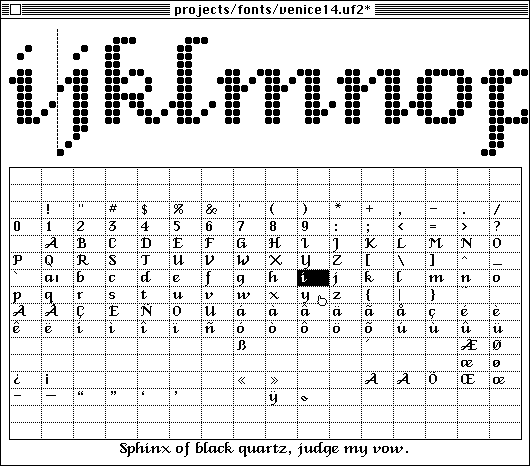
A calculator.
The CCCC calculator is a 16-bit postfix calculator that uses fractions as primitives. It includes two special operators, the reciprocal operator and the yet unnamed operator that is the mirror of a division, where instead of putting the first whole number over the second, it makes whole numbers of the numerator and denominator. The Factorization Mode displays the prime factors each number on the stack.
Basic operations
- 0-f numbers
- +-/* arithmetic
- &|<> bitwise
- tab toggle base
Stack operations
- ent push
- ! bsp pop
- % swap
- " duplicate
- ~ esc clear stack
The calculator plays notes inspired from the Casio VL-80, you can use it to play little tunes.

- Source, Latest
- Repository

A music player.
This player was originally created to test an experimental feature of uxn11 that allows Varvara to communicate with other non-uxn programs, but has since become the only music player that I use. It works as a client to mpg123. The project was created in collaboration with d6.
- Source, Latest
- Repository
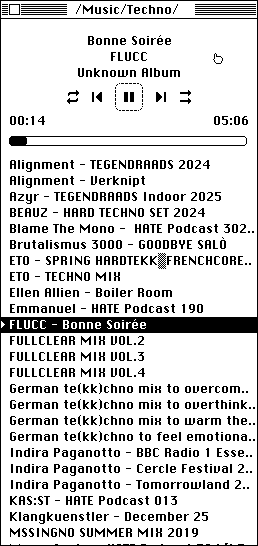
A spreadsheet editor.
Nebu is a graphical spreadsheet editor for the Varvara system, designed to handle csv/tsv files. Math operations are done by specifying a rectangle range of cells, followed by an operator. A range uses the colon character between two cell identifiers. A cell does at most one operation, and the range must precede the cell and may not include itself recursively.
A5:C7*
There are four arithmetic operator + - * /, four logic operator = ! > <, as well as # to get the number of non-empty cells in a range, and " to concatenate strings. If an operator is not specified, it will default to returning the sum.
Launches instantly, and weights less than an empty Excel file.
- Source, Latest
- Repository
- 32-bit fixed point code, by eiríkr åsheim
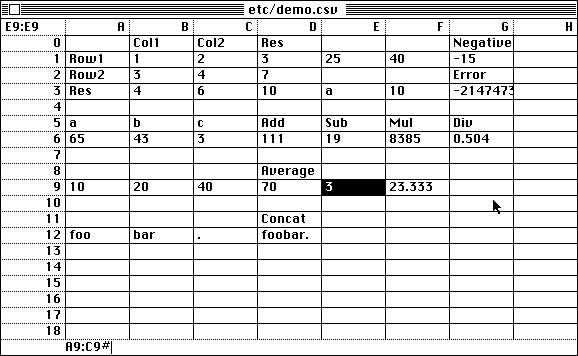
A hex editor.
Dexe is a graphical hex editor created to inspect and edit binary files, it displays hexadecimal bytes, ascii characters and .icn sprites.
- Source, Latest
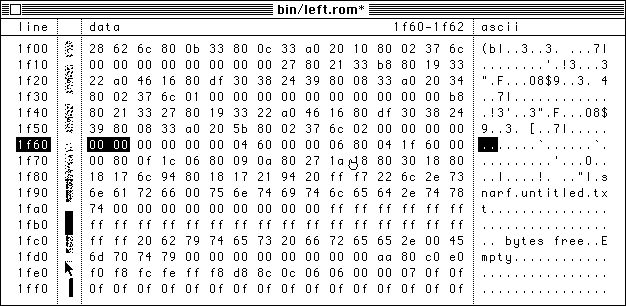
Theme files are the interface customization standard for Varvara software.
A .theme file begins with 6 bytes equal to the RGB values of 4
colors.
0a6f 05cf 0caf
The three shorts above correspond to the four colors below:
| Red | Green | Blue | Hexadecimal | |
|---|---|---|---|---|
| A | 0 | 0 | 0 | #000000 |
| B | a | 5 | c | #aa55cc |
| C | 6 | c | a | #66ccaa |
| D | f | f | f | #ffffff |
Emulators for monochromatic screens do not support Varvara's colors, instead
will display colors 0x00 and 0x02 as black,
0x01 and 0x03 as white.

You can use the following Uxntal routine to implement theme support to your application:
@load-theme ( -- )
;&path .File/name DEO2
#0002 .File/length DEO2
[ LIT2 -System/debug -System/r ]
&l
;&buf .File/read DEO2
[ LIT2 00 -File/success-lb ] DEI EQU ?{
[ LIT2r &buf $2 ] STHk DEO2r
INC INC NEQk ?&l }
POP2 JMP2r
&path ".theme $1
Four colors should be more than enough for any interface.
- Source, Latest
- Repository
A catclock, uh.
This Uxntal implementation of the catclock was created in collaboration with Rekka Bellum.
Catclock is originally a X10 program by Tony Della Fera, Dave Mankins, Ed Moy, Deanna Hohn and Philip Schneider, crafted for entertainment, in the late 1980's. It was also ported to the Plan 9 operating system by Tom Duff, which is where I first came across the catclock.
- Source, Latest
- Repository
- Obscure X11 tools
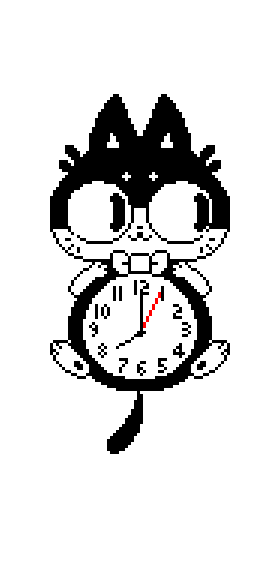
incoming: azolla research faqs aesthetics 2025